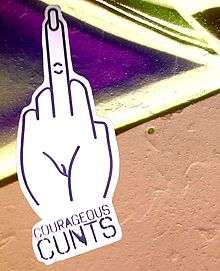Labia pride
Labia pride is a feminist movement which aims to raise awareness of the normal appearance of the vulva and opposes the trend towards cosmetic surgery on the female genitals (labiaplasty, also known as "designer vagina").[1] It is supported by several independent feminist groups and based on diverse channels of communication such as cyberfeminism, protest marches and advocating boycotts against physicians and clinics that make use of deceptive advertising.

Forms of activism
Muff March
The London-based feminist group UK Feminista organized a protest march through Harley Street, an area synonymous with its private medical providers, in December 2011.[2] More than 320 women paraded the street, with slogans like: "Keep your mits off our bits!", "There's nothing finer than my vagina!", and "Harley Street puts my chuff in a huff"[3]

Muff March is about speaking back to a pornified culture which is pressuring women to go under the surgeon's knife and get a 'designer vagina'. We also want to shine a spotlight on the cosmetic surgeons who ruthlessly mine women's bodies to extract maximum profit.[...] Now pornography is exposing women to the toxic myth that there is one 'right' way for their labia to look. It's time to fight back.
The "Muff March" has been criticized for putting too much emphasis on pornography as a root cause of the problem.[4] (See Feminist views on pornography.)
Photo campaigns
The growing demand for labiaplasty surgery is sometimes attributed to the idea that many women, as well as men, have unrealistic expectations regarding genital appearance. Almost all explicit depictions of female genitalia that people are confronted with are produced by the sex industry. Pornography is usually produced in a commercial context and primarily addresses male customers. Therefore, these depictions of female genitalia are often "beautified" to suit commercial need (or in some countries for legal reasons),[5][6] either by the selection of models with a certain anatomy or by photoshopping the images. In practice, this means smoothing out irregularities and "digitally shortening" the labia minora.
A whole generation of young women who have grown up with ready access to the Internet are learning about their bodies and sexuality through this medium...Often the first and only way girls get to have a good look at other girls' naked genitals is through pornography, [which gives] a false view of what real women look like.
— Madeleine Davies[7]

Several feminist groups, such as the Large Labia Project or Courageous Cunts try to oppose the influence that pornography has on anatomic expectations. By encouraging women to release images of their vulvas and post photo submissions of anonymous vulvas on their websites, they want to establish a sphere for women to get realistic impressions of normal vulvas.
However, the campaign itself has been criticized. By giving the false impression that protruding labia are the anatomical norm and small inner labia are the adaptation to beauty standards, it ignores the fact that many women have naturally small labia:
In an effort to make "real women" feel better about themselves, some labia proud ladies are taking shots at girls whose labia actually look like the imaginary "Barbie" ideal. Turns out, some girls are actually born like that. Labia, like boobs or entire bodies, come in all shapes, sizes, colors and textures. Shaming one to make another type feel better is bad news. Think of it in terms of thin women who are often shamed or shunned in support of body image advocacy for larger girls.
— Jessica Sager[8]
Furthermore, these campaigns as well have been criticized for putting too much blame on the porn industry and the subjection to male desires. It is argued that even though this might be the case to a certain degree, other factors that boost these surgeries are basically ignored.[8][9] There is no evidence that smaller labia are actually preferred, as much or more "large labia" porn exists than any labeled for small.
New View campaign
New View is a New York City based, grassroots network of feminists, social scientists and health care providers. In a self-description, New View "is opposed to the growth of the unregulated and unmonitored genital cosmetic surgery industry that is medicalizing women's sexuality and creating new risks, norms and insecurities."[10] The group initiated several events with the aim of empowering women and raising awareness for the topic under names such as the Vulvagraphics or Vulvanomics. These include workshops to "celebrate the role of art in activism and to kick off a campus-based movement to celebrate genital diversity",[11][12] "flash activism" in front of surgeon's offices,[13] conferences (Framing the Vulva)[14] and street demonstrations.[15]
Courageous Cunts

Courageous Cunts was a feminist website,[16] founded in 2012, that is focused on issues of body empowerment and genital self-awareness. Its primary concern is the critical reception of women's health issues, sexualized body images and the sexual objectification of female bodies. Courageous Cunts considers itself to be part of the so-called labia pride movement, with the aim of raising awareness for critical issues around labiaplasty and empowering women to overcome body shame. The site ran a campaign during which women could publicly post photographs of their vulva to promote a natural genital image and protest against "porn aesthetics".[17][18] Using the word "cunt" as their name was an act of reappropriation, as English professor Germaine Greer argues that the ancient vulgarism "is one of the few remaining words in the English language with a genuine power to shock".[19]
See also
- Labia stretching, on the desirability of larger labia
Protests
Art projects
- Vagina and vulva in art (and also Clitoris in art and Erotic art)
- 101 Vagina, an Australian photo-book self-published in 2013
- Femalia, an American photo-book edited by Joani Blank and first published by Down There Press in 1993
- Megumi Igarashi, a Japanese artist who made a kayak out of a model of her vulva
- Jamie McCartney, a British artist best known for his work Great Wall of Vagina
References
- Clark-Flory, Tracy (17 February 2013). "The 'Labia Pride' Movement". Salon.
- Mayer, Chloe (14 December 2011). "Hackney Feminist leads 'Muff March' protest". Hackney Gazette.
- "Rise in 'designer vaginas' sparks Muff March protests" (Press release). UK Feminista. 8 December 2011. Archived from the original on 2 August 2014.
- McAuliffe, Naomi (11 December 2011). "Is the Muff March such a cunning stunt?". The Guardian.
- Drysdale, Kirsten (3 March 2010). "Healing It To A Single Crease". Australian Broadcasting Corporation. Archived from the original on 6 June 2012.
- Labiaplasty Hungry Beast: Ep 14. Vimeo.
- Davies, Madeleine (18 February 2013). "This Ain't No Porn Star Vagina: Large Labias Need Love Too". Jezebel.
- Sager, Jessica (19 February 2013). "The Labia Pride Movement Has A Few Problems". Gurl Magazine. Archived from the original on 26 February 2013.
- Hess, Amanda (20 February 2013). "Insecure About Your Vagina? Sharing a Photo on the Internet Won't Fix That". Slate.
- "Female Genital Cosmetic Surgery (FGCS) Activism". New View Campaign.
- "Vulvagraphics: An Intervention in Honor of Female Genital Diversity". New View Campaign.
- "Vulvagraphics: An intervention in honor of female genital diversity!". Center for the Study of Gender and Sexuality. New York University. Archived from the original on 23 October 2009.
- Flash activism - New View Campaign
- A Different Kind of Vulva Story: Las Vegas New View Conference - About
- Fitzpatrick, Laura (19 November 2008). "Plastic Surgery Below the Belt". Time. Archived from the original on 22 March 2013.
- www.courageouscunts.com archived version of Courageous Cunts website from Internet Archive
- Clark-Flory, Tracy (February 17, 2013). "The "labia pride" movement: Rebelling against the porn aesthetic, women are taking to the Internet to sing the praises of "endowed" women.". Salon.com. Retrieved 2013-04-12.
- Sourdès, Lucile (21 February 2013). "Révolution vulvienne: Contre l'image de la vulve parfaite, elles se rebellent sur Internet" [Vulva Revolution: the Internet Rebellion against the Image of the Perfect Vulva]. Rue89 (in French). Archived from the original on 23 February 2013. Retrieved 12 April 2013.
- "The C Words". Balderdash and Piffle. Series 1. 2006-01-30. 31 minutes in. BBC Two.
... unlike other words for women's genitals, this one sounds powerful – it demands to be taken seriously. In the twentieth century, its strength didn't diminish. ... it became the most offensive insult one man could throw at another. In 1987, at a test [cricket] match in Pakistan, the umpire Shakoor Rana accused English captain Mike Gatting of unfair play. When Gatting denied it, Rana called him 'a fucking cheating cunt'. The fracas caused uproar. Yet only one newspaper, The Independent, dared print the expletive-laden exchange in full. Nearly twenty years later, in some quarters, it is used as a term of affection. Yet for most people the C-word is still a very offensive term ...".
External links
- The “labia pride” movement - Salon